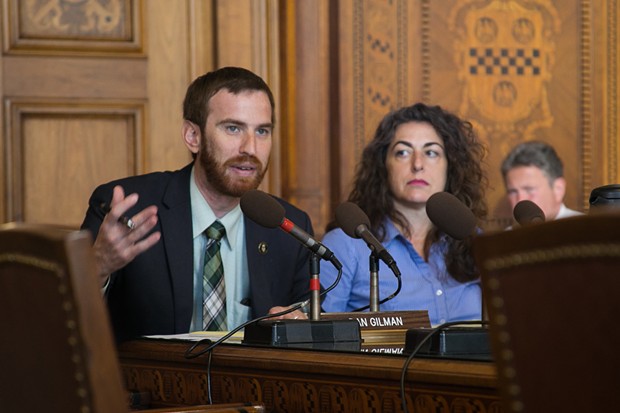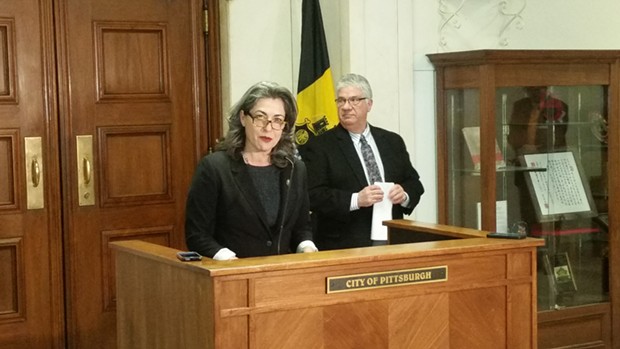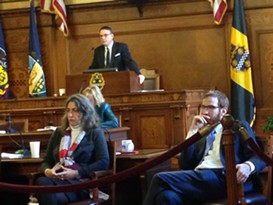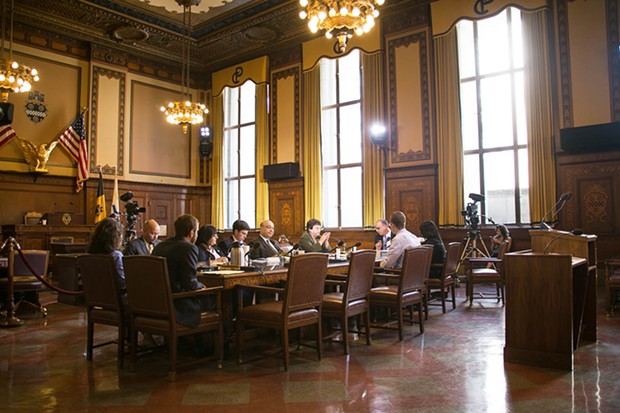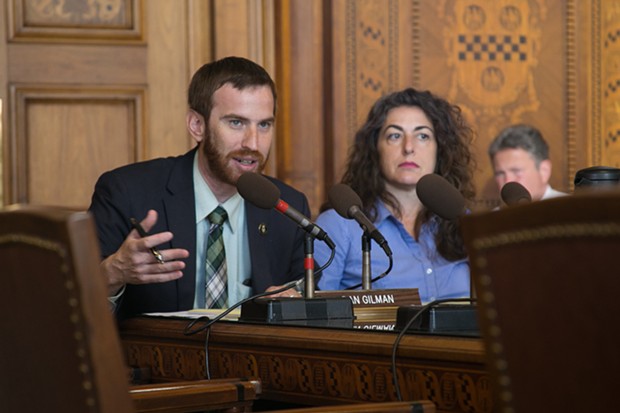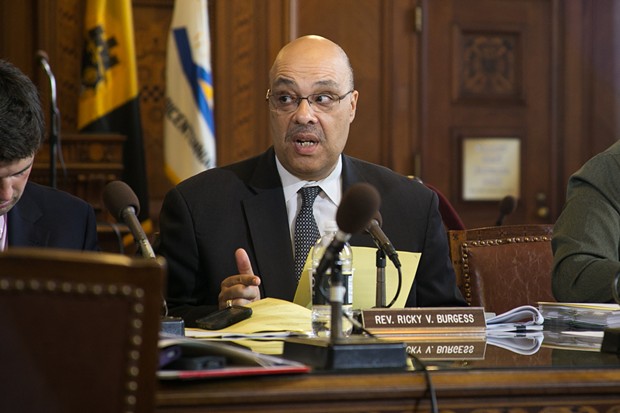Friday, July 7, 2017
State Rep. Patty Kim (D-Dauphin County) has spent the past four years trying to change that. In 2013, she first introduced legislation to raise the state’s minimum wage without success. Last month she proposed it again. The legislation would increase Pennsylvania’s hourly wage from $7.25 to $12 in 2018, and then increase it each year until it reaches $15 in 2024.
Tags: Fight for $15 , minimum wage , Pennsylvania , Dan Gilman , Patty Kim , Tom Wolf , Bill Peduto , Keeping Up With the Council , Image
Wednesday, June 28, 2017
Over the past seven years, the events of that January evening have partly centered around whether or not the officers identified themselves. Had the officers recorded the incident with body-worn cameras, arguments over that fact and perhaps several others might've been laid to rest.
Tags: Dan Gilman , Jordan Miles , Scott Schubert , Tom Wolf , police , body cameras , police brutality , Ed Trapp , Wendell Hissrich , John Doherty , Keeping Up With the Council , Image
Friday, April 14, 2017
People quickly criticized Harris, citing the circus' history of animal mistreatment.
"The cruelty that elephants like this have suffered for decades is unconscionable and one by one, either the tools of the cruelty - bullhooks - or the very source of the cruelty - using wild animals like elephants in circuses - is being outlawed throughout the US," wrote Lori Sirianni on Harris' Facebook page.
And now national animal-rights group People for the Ethical Treatment of Animals is weighing in. Yesterday, PETA sent a letter to Harris about the abuses circus animals experience.
"The circus's deplorable history of hurting and exploiting animals is all in the public record," Rachel Mathews, PETA Foundation associate director of captive-animal law enforcement, said in a statement. "If Darlene Harris is the animal advocate she claims to be, she should support efforts underway in Pittsburgh to ban cruel animal acts — not condone cruelty by riding an elephant."
Harris has been an animal advocate in the past. In 2015, she sponsored legislation, which passed, prohibiting the capture and harm of wild birds; and she's successfully advocated other legislation to help protect animals over the years.
But Harris opposed legislation sponsored by City Councilor Bruce Kraus last year to prohibit performances by wild or exotic animals for public entertainment or amusement. A vote on the ordinance has never taken place. In 2015, Kraus had sponsored legislation making it illegal to use bullhooks or similar devices on elephants, but it was later withdrawn.
Read the full letter PETA sent to Harris below.
April 13, 2017
Darlene Harris
District 1 Council Member
Pittsburgh City Council
Dear Ms. Harris,
I'm writing on behalf of PETA and our more than 6.5 million members and supporters worldwide, including thousands in Pittsburgh, in response to your request for proof of abuse at the Shrine circus. Our files are bursting with reports of cruelty, animal-welfare violations, and other problems. I hope that after learning the facts, you will reconsider your support of circuses that force animals to perform and apologize for promoting the cruelty inherent in using animals for entertainment.
Traci, the elephant you rode recently, was leased from Carson & Barnes Circus, a notorious animal abuser with repeated violations of the federal Animal Welfare Act (AWA). Its laundry list of offenses includes failing to provide animals with minimum space and clean water and failing to identify, convey, or document treatment of veterinary care for several animals, including an elephant who has since died.
You may not realize that elephants do not give rides willingly. They must be violently "broken" first. Tim Frisco, Carson & Barnes' animal-care director, was videotaped viciously attacking elephants with heavy steel-tipped bullhooks and electric prods and instructing trainers to sink the bullhooks into the animals' flesh and twist them until the elephants scream in pain.
Carson & Barnes also has an alarming record of endangering the public. Last year, it was ordered to pay a $16,000 fine to settle an AWA lawsuit after three elephants became frightened, escaped from a performance, and ran amok for nearly an hour. In 2011, a federal inspector saw a circus employee exchanging money with a coworker while the elephant he was supposed to be controlling walked away with passengers in the saddle.
As you know, last year, City Council President Bruce A. Kraus introduced legislation to ban animals from being bred, caged, trained, and transported for entertainment in Pittsburgh. We urge you to consider supporting this legislation, which would spare animals so much suffering.
Sincerely,
John Di Leonardo, M.S.
Senior Campaigner, Animals in Entertainment
People for the Ethical Treatment of Animals
Tags: circus , darlene harris , peta , Keeping Up With the Council , Image
Thursday, March 2, 2017
"Here in Pittsburgh when testing was done in schools last year, 140 water fixtures were found to have lead levels above 20 parts per billion, which is particularly troubling when no level of lead is safe," says Stephen Riccardi, a field associate with PennEnvironment.
Since the Pittsburgh Water and Sewer Authority detected high lead levels in the city's drinking water, the authority and local officials have been working on plans to replace lead service lines in the city's water system, but experts predict replacement will take several years. That's why, this week, Pittsburgh City Councilor Deb Gross called on city stakeholders to work together to provide water filters to all homes with children under 8-years-old, Pittsburgh schools and other childcare facilities.
"We have a long term infrastructure project in front of us," Gross said at a press conference on Feb. 28. "We are currently trying to locate the lead service lines in each and every home in the city and it is our job to find out which homes have lead so we can begin immediate remediation."
Unfortunately, young children are particularly vulnerable to lead. According to the World Health Organization, children exposed to high lead levels experience long-term negative health affects such as behavioral problems and difficulty concentrating.
"Lead exposure continues to be a serious and stubborn public health concern confronting kids, especially in south western Pennsylvania," Ned Ketyer, a local pediatrician said at the press conference. "In infants and children, lead is attracted to rapidly growing organs, especially the brain. It is there in the brain that lead, a natural heavy metal does it's most unnatural damage."
In order to address the issue Gross is looking for partners and donors to supply tabletop water filters to 25,000 households in the city. She says the problem could be addressed for $500,000 and will be asking city council to provide seed money for the project.
When contacted by Pittsburgh City Paper PWSA spokesperson Will Pickering said "PWSA and its Board of Directors are actively exploring all options for developing a drinking water filter program."
Gross said she would be willing to help the Pittsburgh Public School District secure water filters for their facilities, but did not want to speak for the district about how to address the issue in schools. Meanwhile, Pa. Sen. Wayne Fontana is co-sponsoring legislation that would require annual mandatory lead testing in schools across the state prior to of each school year.
"We must do everything we can to reduce the public's exposure to lead," Fontana said at the press conference.
Tags: PWSA , water quality , lead , Deb Gross , water filters , Wayne Fontana , PennEnvironment , Keeping Up With the Council , Image
Tuesday, November 29, 2016
“Even I didn’t know, I only knew that I was different,” says Kraus. “I do remember my parents seeking medical attention to help them understand who and what I was, and help me understand who and what I was.”
Kraus says it never went as far as his parents sending him to “conversion therapy,” the practice of using therapy or spiritual healing to change a person’s sexual orientation from gay or bisexual to straight, but he fears that people and families are vulnerable to this practice.
So, today Kraus and City Councilor Dan Gilman introduced an ordinance to ban conversion therapy on minors within Pittsburgh city limits.
“The City of Pittsburgh bears the responsibility to protect all of its residents and this legislation defends LGBTQIA+ youth against the destructive psychological and physical impact of forced conversion therapy,” said Gilman in a press release. “By passing this legislation, the City is standing up for equality and ensuring that Pittsburgh is a welcoming city for all.”
Kraus says he wanted to introduce this legislation now because of articles detailing the LGBT-related positions of some of President-elect Donald Trump’s cabinet members “absolutely terrified” him. (Vice President-elect Mike Pence supported government-funded conversion therapy while serving in Congress in 2000, and has not disavowed that support.)
“One of the things that scares me about this public acclimation of the possible appointees of the new administration would be to redirect funding from HIV patients in critical need, and take that money and redirect it into conversion therapy,” says Kraus. “I find this to be Neanderthalic in thought.”
(In a boon to advocates for HIV treatment, today Pittsburgh City Council also passed unanimously a will of council that urges all doctors to test for HIV during all routine visits.)
Kraus says that support of conversion therapy from the Trump administration might give support to homophobes and others who attack LGBT people, such as how Trump’s victory emboldened some to bully and harass minorities, refugees and immigrants. Kraus says this legislation is a call to the LGBT and their allies that Pittsburgh is a safe place for them.
Six states, including California, Illinois and New Jersey, have passed conversion-therapy bans for minors. In the last year, other cities have followed suit, like Cincinnati, Miami Beach and Seattle. Kraus says that Pittsburgh has always been a leader in protecting LGBT-rights and says he expects “full support from council” on the passage of the bill.
Kraus adds that he has conferred with legal council and believes the ordinance will hold up, if challenged in court.
Tags: Pittsburgh City Council , Bruce Kraus , Dan Gilman , Donald Trump , Mike Pence , Keeping Up With the Council , Image
Wednesday, November 16, 2016
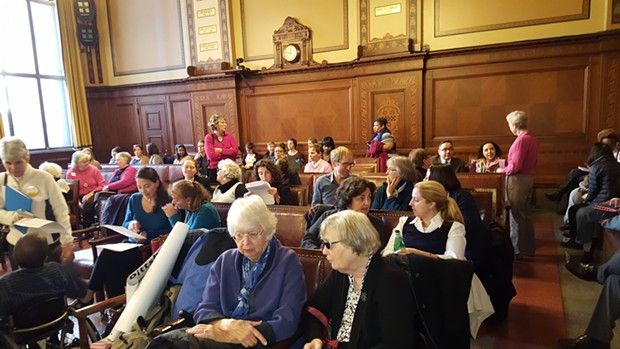
So it should come as little surprise that the U.S. isn't ranked in the top ten for gender equity either. We're 28th. And when it comes to gender pay equity, America ranks 74th. Here in Allegheny County, women make 68 cents for every dollar a man makes.
"You will hear people say the wage gap isn't real," Jessie Ramey, director of Chatham University's Women's Institute, said yesterday. "Don't listen to them. It is real."
Yesterday's Pittsburgh City Council special meeting and subsequent public hearing centered around city legislation to adopt the Convention on the Elimination of all Forms of Discrimination Against Women (CEDAW), an international treaty adopted in 1979 by the United Nations General Assembly. While CEDAW has not been adopted by the United States (and only 6 other U.N. countries, including Iran), cities across the country have adopted elements of the treaty.
"It allows us to examine issues related to gender," said Sara Goodkind, a professor with the University of Pittsburgh School of Social Work, at yesterday's meeting. "The CEDAW ordinance gives Pittsburgh the opportunity to be at the forefront of equity and inclusion work."
Cities that have passed similar ordinances have seen results like more equitable workplaces and lower incidences of domestic violence. San Francisco's CEDAW ordinance was credited for the elimination of domestic homicides for a record 44 months in a row from 2010 to 2013. For the past three years, Allegheny County has had the most domestic violence related homicides of any other Pennsylvania county.
"A gender analysis is an excellent step to addressing gender inequities," said Barbara Grover, of the Sierra Club who testified at the public hearing. "We certainly have made progress over the last 60 years, but equity in all areas of women's lives has not been achieved."
The legislation calls for the creation of a Gender Equity Commission which would conduct gender analysis of issues like education, violence, economic development, and city services. The commission would also work with city government to educate employees about these issues, identify inequities, and take steps to eliminate systemic discrimination.
"What I think our challenge is going to be is how do we take this from an academic perspective and make it practical for people," said Councilor Natalia Rudiak who sponsored the local legislation. "Let's look at economic development projects that are receiving public dollars. Is there a gender pay gap in those projects that are receiving public dollars? I want to emphasize that when we talk about this, we need to tease out these real life examples."
During the time Pittsburgh City Paper observed yesterday's discussion on gender equity in council chambers, only councilors Rudiak, Deb Gross and Darlene Harris were in attendance. All three voiced support for the legislation.
"I have millions of dollars of development in my district," Gross said. "What does that look like with gender analysis."
Studies have demonstrated that international economies can benefit from implementing CEDAW. According to a report by United Kingdom advocacy organization Action Aid, women could increase their income globally by up to 76 percent if the employment participation gap and the wage gap between women and men were closed. The group says this would have a global value of 17 trillion U.S. dollars.
"Unequal pay serves as a barrier to not only coming out of poverty but breaking the cycle of poverty that so many of our families ourselves in," Carlow University student Traci Johnson said yesterday. "Women need economic opportunities that provide family sustaining jobs. These polices will aid in eliminating the fear and anxiety that many women feel when trying to provide for their families."
Tags: gender equity , pay gap , wage gap , city council , Pittsburgh , Keeping Up With the Council , Image
Thursday, September 22, 2016
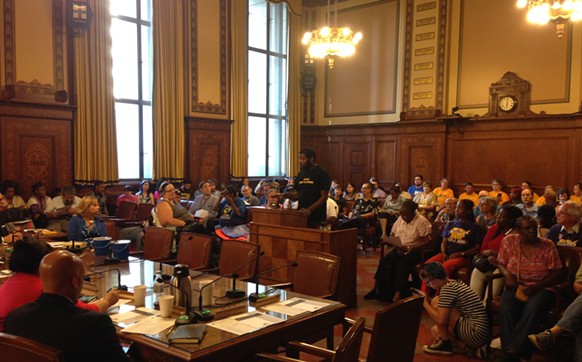
“We want this trust fund to go through,” said Richard Morris, chair of the city’s Committee on Human Relations. “If we leave it up to the banks, [affordable-housing growth] will not happen.”
Most in the crowd of around 200 held up signs reading “Housing is a human right” and voiced support for the fund, saying it was necessary to curb gentrification in some Pittsburgh neighborhoods. Joshua Malloy lives in East Liberty and says that even his wage of $13 an hour is not enough to live in the new apartments in the neighborhood. He says if he is forced to move to a place like Penn Hills, his access to public transportation will be severely cut.
“Whenever those who can no longer afford to live in their homes, where do they go?” asked Malloy. “We need this [fund].”
Many in the crowd also requested that low-income residents be part of advisory boards for the housing fund; that transit access continue to be a priority; and that policies such as inclusionary zoning (where new developers are required to include percentages of affordability) be considered.
But a few in the crowd voiced displeasure over the proposed manner that the funds would be raised. Charlene Haislip, a local real-estate agent, said she supported more affordable-housing efforts, but said raising the real-estate transfer tax would put a burden on people looking to purchase homes in the city. “We don’t believe that increasing the cost of buying a home is the answer to making housing more affordable” said Haislip.
Helen Gerhardt, who was representing housing-activism group Homes for All, said she strongly supported the housing fund. She said raising local funds could contribute to a discrepancy in federal funds for rental-housing assistance. (In 2015, the federal government contributed around $130 billion toward subsidies for home ownership and only around $40 billion for rental subsidies, according to the Center on Budget and Policy Priorities.)
Advocates gathered 13,000 signatures to put the creation of the fund to a vote as a ballot initiative this November, but decided in August to let council handle the matter instead. City Council President Bruce Kraus (D-South Side) pledged at the meeting that a vote to create the Housing Opportunity Fund would happen before the end of 2016.
Tags: Pittsburgh City Council , Housing Opportunity Fund , Bruce Kraus , Keeping Up With the Council , Image
Wednesday, July 6, 2016
Chesney is frequently the target of criticism for his yearly visit to the Steel City. At this year's concert over the July 4 weekend, seven were arrested and 37 were hospitalized according to local police. And officials estimate 48 tons of garbage were cleared from North Shore parking lots by city officials.
While the city can do little to stifle the chaotic revelry at Chesney's yearly visits, a new ordinance introduced in Pittsburgh City Council today could ensure performers like him are paying what they owe for performances in the city.
"Performers need to pay their fair share for the right to use taxpayer-funded facilities," Finance chair Natalia Rudiak said in a statement. "Taxpayers should not be picking up the check for regulating crowds, cleaning up, and wear and tear on these facilities. This fee will pay taxpayers back, and that is the bottom line."
The ordinance, being introduced by Mayor Bill Peduto's administration, would close a loophole that allows performers to hide income they make from performances at taxpayer-funded facilities. The statement released today says performers were hiding earnings from the city "by paying themselves a small amount and utilizing a trust account to shield the remainder of their earnings."
Currently, visiting athletic teams, musicians and other for-profit performers are required to pay a 3-percent-facilities fee on their earnings from use of a taxpayer-funded facilities. Controller Michael Lamb discovered the loophole in his audit released at the end of last year. In the audit, he said the loophole could result in the city losing out on tens of thousands of dollars every year.
"We are closing any loopholes that would allow performers to dodge paying when they are legally and ethically required to do so," Finance director Paul Leger said in a statement.
According to the statement, the new city ordinance "will make sure that taxpayer dollars are going toward paving roads and maintaining our parks instead of crowd control and clean up for special events."
Tags: Kenny Chesney , Pittsburgh , Heinz Field , taxpayers , loophole , city council , Keeping Up With the Council , Image
Friday, June 10, 2016
"What we have heard has happened in the past is basically a landlord would say I don't want trouble here because of a lot of police visits, because of a lot of loud noise, because of neighbor complaints about disturbances," said Councilor Dan Gilman who sponsored the legislation. "And victims end up losing their housing. This would guarantee their protection."
At the council meeting on Wednesday, Council President Bruce Kraus signed on as a co-sponsor of the bill. He also expressed a desire to change the verbiage of the legislation from domestic violence to intimate partner violence, a change Gilman noted might not be
"I always worry that we compartmentalize intimate partner violence as only happening in the home and we know that's simply not true," said Kraus. "We know it happens public spaces and work places all the time."
District 2 Councilor Theresa Kail-Smith took the opportunity to raise concerns about whether victims of domestic violence are getting the help they need.
"Other residents are effected by this. They are effected by seeing things happen in the community," said Kail-Smith. "There has to be some response from the women's shelter and any organization that works with domestic violence or intimate partner violence. So it's not just continuous calls [to the police] and continuous calls and no one is getting any help."
Councilor Darlene Harris expressed concerns about the impact of domestic violence on neighbors.
"There's a lot of violence that can happen there if someone loses it and brings a gun in and starts shooting kids," said Harris. "There has to be some kind of attempt to stop the situation from happening because of the safety that others who may live in the building."
Tags: domestic violence , housing discrimination , intimate partner violence , Pittsburgh , city council , Keeping Up With the Council , Image
Tuesday, May 17, 2016
At a meeting held by Pittsburgh City Councilor Ricky Burgess last week, the Urban Land Institute presented what they called a teaser for their recommendations regarding future real estate and economic redevelopment in the East End.
“All of them revolve around issues of maintaining the character of the community — the essential character of the communities — while trying to attain affordability, both of housing stock and of business stock, and social equity in an environment where there’s a lot changing, and changing fairly quickly,” said ULI panel member Alan Razak.
ULI partnered with the city, and — with the assistance of a panel of non-paid real estate experts from across the nation — spent May 8-13 in the East End, speaking with residents and analyzing data gathered by other sources on the state of its neighborhoods.
The study is part of Burgess’s HELP Initiative which came to fruition in October of last year and aims to direct development in the Homewood, East Liberty, Larimer, Lincoln, Lemington and Belmar neighborhoods to ensure affordable housing.
The key recommendations in ULI's report included: completing a plan to make neighborhood planning easier across the city, creating property tax protection, engaging with anchor institutions (with an emphasis on philanthropic organizations like universities and hospitals), combating neighborhood boundaries, working east-to-west geographically in terms of tackling neighborhood revitalization, engaging current residents and using the HELP Initiative and East Liberty Development, Inc.’s presence in the communities to their advantage.
Board members from ULI walked through every East End neighborhood in their presentation, going over a series of recommendations, unique to each. They emphasized that each neighborhood has its own set of characteristics, and that these qualities should be taken into consideration before making any major changes.
The researchers found a mixed sense of boundaries in the East End contributes to a disparate idea of where neighborhoods begin and end. ULI recommended the use of parks and green space to designate neighborhood lines, while connecting the communities.
The study determined that the median income for Pittsburgh residents is approximately $41,000, while median income for East End residents is $23,000. Median home purchases came out to around $24,500 in East End, but home repairs and renovations for homes in the area are at around $150,000 per home.
ULI presented data that suggests Pittsburgh will experience a population growth of 29,000 in the next two decades, stating that East Liberty will likely absorb most of this residential demand.
“What does a city that used to be 600,000 people look like when it’s 300,000 people?” said Razak “It’s a potentially tough choice. In simplest terms, it boils down to when you have a population, do you cut the area in half, or do you cut your density in half? If these were the only two choices, we on the panel, I think, would opt for density.”
Of the 3,519 housing units in East End, nearly 87 percent are occupied, and of those occupied residences, 78 percent are rentals. One million square feet of commercial property is present in East End, and ULI said the area has huge potential to develop economic growth if the the proper steps are taken.
The full East End revitalization plan is currently being compiled by ULI, and the post agenda presentation is available for viewing on City of Pittsburgh’s website.
Tags: affordable housing , development , Pittsburgh , East End , city council , Keeping Up With the Council , Image



